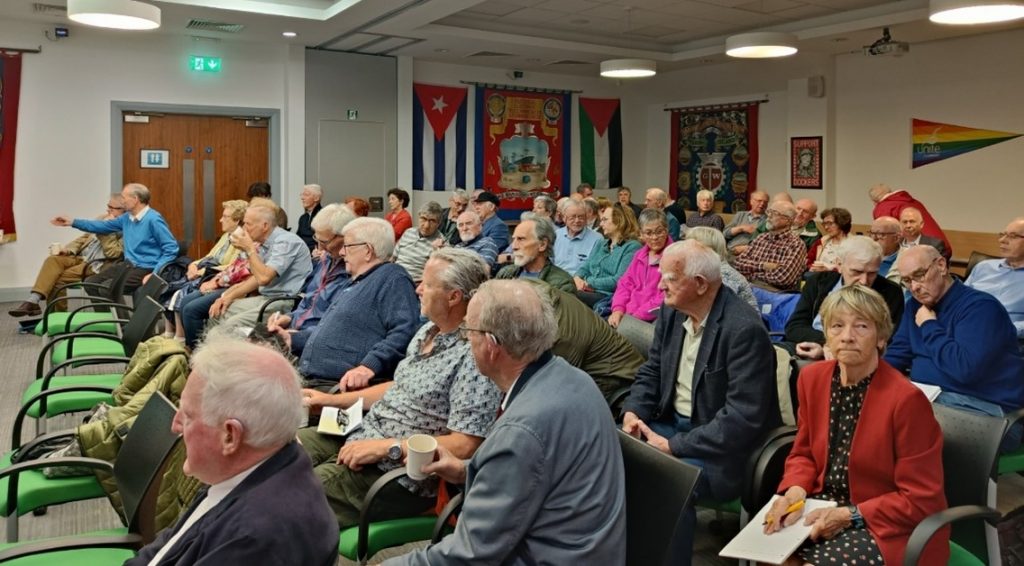The Irish Senior Citizens Parliament hosted a meeting to bring together member organisations affected by the lack of a voice regarding their occupational pension. This has resulted in loss of income for many people in an environment of ongoing cost of living increases and hikes in energy costs.
The ISCP formed a collective network some three years ago to address the lack of engagement with pensioners regarding changes to their pension provision. The ISCP supports the progression of the Industrial Relations (Provisions in Respect of Pension Entitlements of Retired Workers) Bill 2021 which is sponsored by Brid Smith. The Bill is before the DAIL and ISCP and the Collective Network of Retired Staff Associations have campaigned heavily to have this progress through all its stages. If passed, the Bill will address the fundamental right of pensioners to be at the table when any decision effecting their pension is being decided. Currently, the Bill is at second stage and is awaiting a report from the Joint Committee.
We thank UNITE for their support in providing the venue on Tuesday 28th of May. We had a full house and were delighted with the turnout from across the country and in particular the engagement of the members on the key issues. The meeting was opened by Pat Mellon, ISCP National Coordinator, who voiced the ongoing commitment of the ISCP to seeing the BILL passed. Eileen Sweeney gave a detailed overview of the work to date on the campaign and Pat welcomed Brid Smith, who took members through the history behind the Bill and its progression to the current stage. She highlighted the disrespect shown to older people by the lack of engagement of the Government on this key issue.

Dr Nat O’Connor from Age Action, whom the ISCP work with on many campaigns, highlighted the reality of income for older people.
“If we look at PAYE income—income that is subject to tax but not including the state pension—of people at the age of 70, the median income—the middle point if you lined people up from lowest to highest income—is €8,136. Half of people at the age of 70 have an income less than that, not including the state pension, but an occupational or private pension income of €8,136 or less. At age 80, it’s €7,700 or less. That’s the middle point. Half of people have more, and half have less.”
In 2022, one in five people aged 65 or older were ‘at risk of poverty’; that is, an income below the poverty line. One in three older people living alone had an income below that line. Dr. O’ Connor went on to explain
“We are sometimes told we have a very generous state pension, but when you look at the European statistics, at income replacement, it tells a different story. Income replacement looks at the income of people in their late 60s and compares this, as a percentage, with the income of people in their 50s. So, to what extent is the pension income replacing work income. You don’t expect it to replace 100%, but the European average is 58%—on average, across Europe, pensions (from all sources) replace 58% of the working income of people in their 50s. In Ireland, it’s 38%—the second lowest in the European Union.”
“Some people like to say that inflation is going down. The inflation rate is a smaller number than it was. But prices are not going down, because it is still a positive number. Inflation is still 2-3%, therefore prices are going up 2-3%. And is your income going up 2-3%? If it’s not, then your spending power is going down. And with 24% inflation, between 2020 when it started, through to the end of next year, then €100 in your hand will buy you what around €80 would have bought you in 2020. So you’ve had the cuts (to state occupational pension funds through the pension levies) and inflation.” The full report from Dr O’Connor is available, so please contact us if you would like more information.
The meeting was addressed by some of the members of the Collective Network on the impact of loss of earnings and having no voice at the table. Paddy Fagan spoke about pension poverty arising from the cuts over the years. John Nugent expressed the urgent need to ensure the lack of engagement by the Government on this issue is addressed.
We thank all who took part in the discussions following the panel inputs and we hope to see you all engaging with your local politicians to create the need to have this Bill passed and to end the inequality and discrimination faced by retired workers and employees.